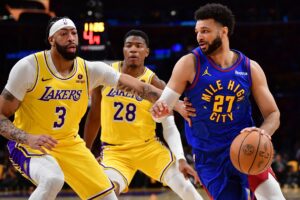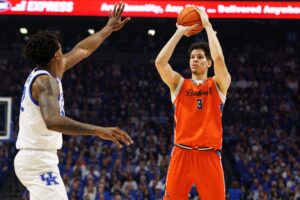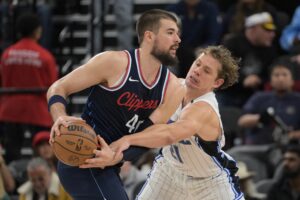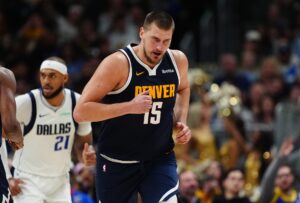Damian Lillard’s Legacy in Portland Begins Now
Whether it be his elite presence on the offensive side of the court – being able to score at will – or his ability to resonate with the media and fans through his humble nature and music, Damian Lillard has the admiration and respect of almost all NBA watchers alike. On an individual scale, it is difficult to break down to what extent he himself can improve as a player. Portland is a city in love with Damian Lillard, and there are many ways in which he has reciprocated this love.
So why, then, after a career season, averaging a monstrous 27-6-5 stat-line, was he snubbed from both the All-Star team and more recently, the All-NBA team? Perhaps his defence may be modest at its very best, and maybe he isn’t the best shooter on the Blazers (Hello, C.J. McCollum). However, there exists a larger, simpler reason why. Portland needs more success, as a whole.
After 44-38 and 41-41 seasons as the leader of this young team, Lillard’s mind should be in the win now zone. At 26, he’s playing the best basketball of his life but needs tools around him to elevate the Blazers to a level that must at least attempt to compete in the ridiculously difficult western conference. Change needs to come from everywhere; his team-mates, the front office and himself. As the head of this franchise, it is his responsibility to evoke this change, and transform the Blazers into a powerhouse for years to come.
The extent to which Damian Lillard leaves a footprint on the Trail Blazers will be decided by how well he tackles their currently middling situation in the next few seasons, coupled by how well he is supported; by teammates and the front office alike.
He Must Strive To Sharpen His Teammates
Year: Points Per Game – Player Efficiency Rating
1st year: 19.0 – 16.4
2nd year: 20.7 – 18.6
3rd year: 21.0 – 20.7
4th year: 25.1 – 22.2
5th year: 27.0 – 24.1
With or without these stats, to the naked eye, it is easy to see how much Lillard improves from season to season. Every year, he shoulders a little more responsibility, setting himself higher expectations and matching them with subtlety.
Even so, while he can raise the bar for himself as high as he wants, it is the translation of these performances to wins for the team that will put forth his mark. The correlation between personal stardom and group success isn’t very clear, but Lillard’s teammates, whether or not they remain the same bunch next season, need to also significantly mark up their game, on both ends of the floor.
C.J. McCollum and Jusuf Nurkic make up the next rung of the Blazers hierarchy, and although the team struggled throughout the regular season, they had a 15-7 record with all three of these men of the floor. The team’s problem lies in the members beyond the de-facto big three, where roles get confused and there is a genuine squad depth issue.
Each ‘role player’ on the Blazers has a unique Achilles heel – some players with more than one – that when put together, makes for an awkward lineup that struggles to compete against elite opposition talent. Take, for example, Al-Farouq Aminu. He may well be the teams heart and soul on defence, but gobbles up too much of the ball on the other end of the floor. It is too often that possessions are wasted with him and his lacklustre dribbling.
Allen Crabbe and Evan Turner, on the other hand, are usually useful tools on the offensive end, averaging roughly 10 points apiece. Crabbe specialises in 3-point shooting, finishing with the 2nd best clip of the regular season amongst all NBA players at 0.440, while Turner is an above average midrange shooter, with post presence. Nonetheless, in the past season, neither of them displayed nearly enough fireworks to live up to their inexplicably large contracts. ($70 million +, over four years, apiece).
The coaching staff in Portland can pull all the tricks out of their bag, but at the end of the day, it will be down to Damian Lillard to inspire his teammates to play at an echelon higher than the one they currently lie in. He’s got all the ‘intangibles’ down. There aren’t many players in the league with as much passion, fight and willpower as him. If Portland are to stick with a similar team for next season, though, Lillard must improve other aspects of his leadership.
These aspects mainly consist of the small things; improving chinks in teammates’ armour. Every possession that Aminu doesn’t turn the ball over is an opportunity to score. Every possession that Crabbe doesn’t hesitate to shoot the ball could be an extra dagger. Every possession that Noah Vonleh successfully posts up a player could be more growth in an exciting young prospect. It should be Lillard’s job to actively seek out these Achilles heels’ in all members of the roster, and correct them. By tightening the screws little by little, the Portland Trail Blazers will become a more compact, harder to beat, basketball team.
Leave a Legacy
Lillard is in a situation where the next few years of his career and the impact he has on this team will define his legacy in Portland. He may not ever be able to bring a championship to Rip City, but in the long term it is entirely possible that Lillard retires as the king of Blazers basketball. While that may be a long and winding road ahead, the goal towards achieving it starts now; with him and an underperforming team. Great players play great basketball, but it is the elite than make a genuine impact on their team’s success.
Before moving ship to San Antonio to chase a ring in the 2015 off-season, LaMarcus Aldridge boldly proclaimed his goal to ‘be the best Blazer. Ever.’
Lillard hasn’t come out and uttered those exact words yet, but it is something that will undoubtedly rest in his mind. Brace yourself for the next few seasons of Blazers basketball, if things go right.
It’s Lillard time.
Main Photo
Damian Lillard (Photo by Mark Downey Lucid Images/Corbis via Getty Images)






